Language Modules
Table of contents
The language training in the Master's degree program "European Languages" includes a Romance language(French, Spanish or Italian) and a Slavic language(Russian, Polish, Czech or Sorbian) or a classical language (Latin or Greek). EuroS students have the opportunity to learn their chosen Romance, Slavic or classical foreign language for the first time or to improve their existing knowledge. Once chosen, the languages are retained throughout the entire course. A change of choice is only possible in the "Language Theory" track.
At the beginning of the semester, EuroS students report their chosen language learning seminars and planned examinations to the course supervisor.
Structure of the language modules
The language selection in EuroS is based on the tracks. If you study the language theory track in the EuroS, you choose two of 23 compulsory elective modules. A module can be chosen more than once if the languages chosen are different.
If you were enrolled before the winter semester 2024/25, please note that the language theory track for Slavic languages contains fewer modules. The modules for levels A1, B1.1, B2.1 and C1.1 and C2 are missing. These can be taken, but not credited, only after transferring to the new regulations. Please contact the course advisor for more information.
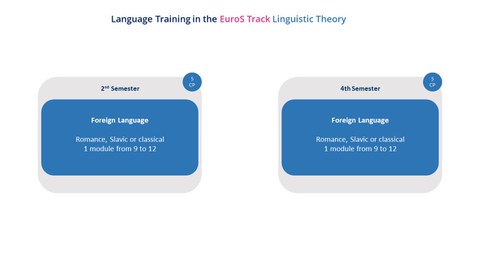
Sprachausbildung im Track "Sprachtheorie"
In the Language Diversity track , you choose two language specializations; one language specialization worth 10 credit points and one language specialization worth 15 credit points. You can choose between the language specializations Slavic Foreign Languages, Romance Foreign Languages and Classical Languages. Within each language specialization, you choose a foreign language in ascending order of level. You can choose from Russian, Polish, Czech and Sorbian in the Slavic foreign languages specialization, French and Italian (Spanish or Portuguese on request) in the Romance foreign languages specialization and Latin and Greek in the Classical languages specialization.
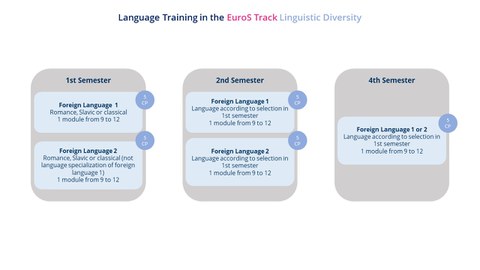
Sprachausbildung im Track "Sprachenvielfalt"
The structure of the language modules is based on the levels of the Common European Framework of Reference for Languages (CEFR):
- A1 - Beginner I
- A2 - Beginner II
- B1.1 - Basic I
- B1.2 - Basic II
- B2.1 - Advanced I
- B2.2 - Advanced II
- C1.1 - Advanced I
- C1.2 - Advanced II
- C2 - Advanced
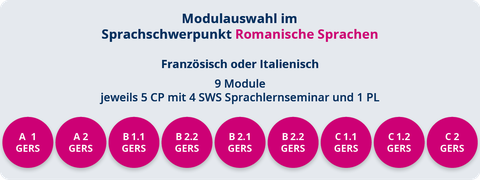
Wahlpflichtmodule im Bereich "Romanische Sprachen"
*** The foreign languages Spanish or Portuguese are also possible.
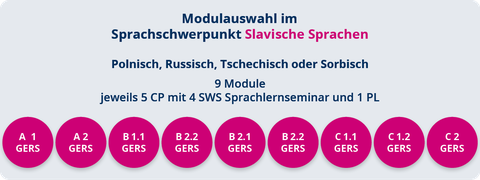
Wahlpflichtmodule im Bereich "Slavische Sprachen"
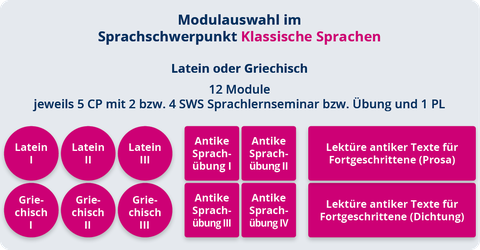
Wahlpflichtmodule im Bereich "Klassische Sprachen"
Placement with previous knowledge
Depending on their previous knowledge, EuroS students choose a level from A1 to C1.1 as their first module. If their previous knowledge exceeds C1.1, they must choose another foreign language. It is possible to "skip" individual modules if your language skills have been improved during your studies, for example through a longer stay abroad.
The placement tests and placement interviews of the faculty and the Teaching Center for Languages and Cultures (LSK) should be used to select the correct starting module before the start of the semester.
Examinations
Students attend 4 SWS of language learning seminars per module, which are completed either as a double course or as two separate courses of 2 SWS each. At the end of the seminars, students sit a 90-minute language exam . The modalities and implementation of the language exam vary depending on the language modules and language levels and must be agreed with the respective language lecturer. Exam registration runs via Selma.
Courses offered
EuroS students can attend the language courses offered by the Faculty of Linguistics, Literature and Cultural Studies (SLK). In addition, the language courses of the Teaching Center for Languages and Cultures (LSK/TUDIAS) can also be used.
At the LSK, EuroS students have a budget of 12 SWS per chosen Romance and Slavic language. It is important to ensure that the chosen Romance and Slavic language is selected in OPAL before enrolling in a language course. In addition, Master's students at the LSK have a budget of 4 SWS for further foreign languages (as long as this has not already been used up in the Bachelor's program). For questions about the LSK budget, please contact Dr. Jeannette Morbitzer.
To choose the appropriate language learning seminars, please consult the following overviews of the semester-spanning courses offered by the Institutes of Romance Studies and Slavic Studies and the LSK:
The language courses are to be selected according to the next higher level or the next higher language module - if applicable, based on the result of the placement test. Questions regarding the choice of language courses and examinations can be sent by e-mail to the course supervisor.
Further options for foreign language learning
TUDIAS
World Trade Center
Freiberger Str. 37
01067 Dresden
Tel.: +49(0)351 40 470 240
Kästner Kolleg e.V.
Tannenstraße 2
01099 Dresden
Tel.: +49 (0) 351 80 36 36 0
Volkshochschule Dresden
Geschäftsstelle in Seidnitz
Schilfweg 3
01237 Dresden
Tel.: 0351 254 40-0
Are you looking for a tandem partner, i.e. a native speaker who can support you in your language learning and who you can also help to learn your native language? Then the following links may be useful to you:
- Mediation of learning partnerships of the Multimedia Language Learning Center of the TU Dresden
- Tandem exchange of the Kästner Kolleg e.V.
- Online placement of tandem partners in German-speaking countries: http://speak2speak.de/
- Finding tandem partners for Russian, Polish and Czech at the Institute for Slavic Studies
- Mediation of e-Tandems of the Ruhr-Uni Bochum
